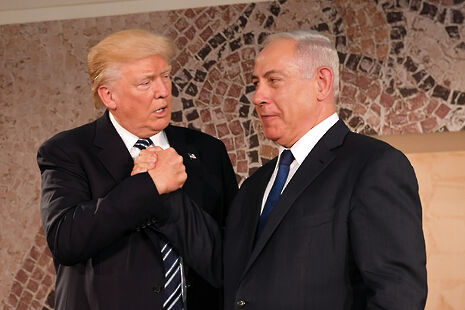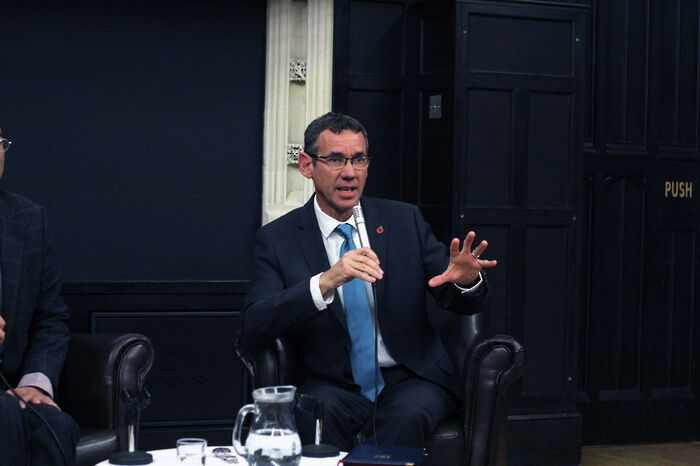Jerusalem has been recognised as Israel’s capital for decades
Following Trump’s recognition of Jerusalem as the capital of Israel, Daniel Ohrenstein dismisses the controversy, suggesting this was no surprise for historians and academics

President Trump recently made the following proclamation: “It is time to officially recognise Jerusalem as the capital of Israel… Acknowledging this as a fact is a necessary precondition for achieving peace.” Many thought it would send shockwaves through the Middle East. This recognition was a major campaign promise, appeasing his strong evangelical support base and constituting part of his battle to rip up Obama’s legacy. Immediately, criticism began to flood in from governments and international organisations. The BBC claimed he was overturning “decades of official US policy”. Hamas, the Islamic fundamentalist terror organisation that controls Gaza, declared that Trump had opened the “gates of hell” and called for a “day of rage” (a term used to describe a day of protests against Israel, which can descend into violence against Israeli civilians). However, among academic circles, Trump’s announcement was not a surprise, nor was it incongruous with the peace process.
“Trump’s statement should not diminish Palestinian national ambition”
The State of Israel was established in 1948 following the adoption of UN Resolution 181, calling for the partition into “Independent Arab and Jewish States”. A day later, the fledgling state was immediately under existential threat when attacked by a military coalition of five Arab states – Egypt, Jordan, Syria, Lebanon and Iraq. The Israelis defeated the invasion, but Jordan occupied large swathes of land (today known as the West Bank), including East Jerusalem. At this point, Israel established its capital in western Jerusalem and this is where the seat of government, the judiciary and all subsequent state visits have been located ever since. These borders, although established in the 1949 armistice agreement, are referred to the as the “1967 borders” as this remained the status quo until the Six Day War in 1967 when Egypt, Jordan and Syria unsuccessfully repeated their attempt to undermine the Israeli claim to sovereignty. During the interwar period, control of the ‘Old City’ – located in the East – lay with Jordan, who blocked Christian and Jewish worship at their ancient religious sites. After 1967, Israel gained control of the eastern part of the city, re-establishing freedom of religious practice for all, but immediately handed over control of the Haram al-Sharif / Temple Mount complex (including Aqsa Mosque) to a Jordanian custodian organisation called the Waqf, who have banned Jewish prayer at the site (the holiest in Judaism) ever since. The Jewish connection to Jerusalem is easily traced through historical artefacts and archaeology, dating back as far as the Kingdom of Judah 2800 years ago. However, this history is regularly ignored by both the Palestinian leadership and international bodies such as UNESCO. Indeed, on 13th December, the head of the Palestinian Authority made a speech at the Organisation for Islamic Cooperation in Istanbul where he claimed Jews are “excellent at faking and counterfeiting history and religion”. As such, Trump’s recognition, based on US policy voted on almost unanimously by the Senate in 1995, was widely welcomed amongst Israelis.
The Arab response must be understood in the context of the peace process. The first phase of the Oslo peace process consisted of letters of mutual recognition and the renouncement of terrorism by the Palestine Liberation Organisation, led by Yasser Arafat, the Egyptian founding member of Fatah. During this time, the five permanent status issues, of which Jerusalem is one, were identified and left to be negotiated later. The fact that these five issues have yet to be settled in bilateral negotiations between the Israelis and the Palestinians is the root cause of the diplomatic furore surrounding Trump’s announcement. However, the violent protests that erupted in the West Bank and the wider Arab world stem from something far more deeply rooted.
The Palestinians have a legitimate and credible claim to statehood under the principle of self-determination. Rashid Khalidi, Professor of Arab Studies at Columbia University, traces Palestinian nationalism back to the 1930s but wrote that “it is a serious mistake to suggest that Palestinian identity emerged mainly as a response to Zionism”. Since the conception of Palestinian nationalism, the Palestinian leadership have been leading their people down the cul-de-sac of rejectionism. Educational documents in UNWRA schools fail to make any mention of Jewish history in Jerusalem. Facebook pages run by the Palestinian Authority regularly deny any historical Jewish presence. Hamas’ founding charter contains calls for extermination of the Jews. Under these conditions, it is unsurprising that Trump’s announcement has been met with violent protests. On 8th December 2017, protesters outside the US embassy in London chanted “Khaybar Khaybar, ya yahud, Jaish Muhammad, sa yahud”, which translates to “Jews, remember Khaybar, the army of Muhammad is returning”, a reference to the massacre of Jews in Khaybar in 628 CE.
In 1949, Israel made Jerusalem its capital. This status quo has been unchanged ever since. While the final status of East Jerusalem must be finalised in bilateral negotiations, the myth that Israel choosing to have its capital in Jerusalem is somehow controversial is ahistorical and a denial of the sovereign right of a democratic state. Trump’s statement should not diminish Palestinian national ambition. On the contrary, he stressed the importance of maintaining the status quo at Muslim holy sites. I am no supporter of Trump, but we must not allow our opinion of him, or fear of violence from extremists, to cloud our judgement of what is merely recognition of something historians, academics and politicians have known for decades
 Comment / Plastic pubs: the problem with Cambridge alehouses 5 January 2026
Comment / Plastic pubs: the problem with Cambridge alehouses 5 January 2026 News / Cambridge academics stand out in King’s 2026 Honours List2 January 2026
News / Cambridge academics stand out in King’s 2026 Honours List2 January 2026 News / Cambridge businesses concerned infrastructure delays will hurt growth5 January 2026
News / Cambridge businesses concerned infrastructure delays will hurt growth5 January 2026 News / AstraZeneca sues for £32 million over faulty construction at Cambridge Campus31 December 2025
News / AstraZeneca sues for £32 million over faulty construction at Cambridge Campus31 December 2025 Interviews / You don’t need to peak at Cambridge, says Robin Harding31 December 2025
Interviews / You don’t need to peak at Cambridge, says Robin Harding31 December 2025










